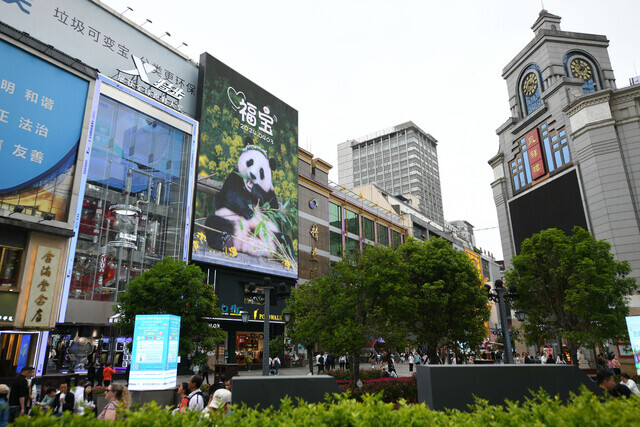hankyoreh
Links to other country sites 다른 나라 사이트 링크
Can a giant panda fix South Korea’s relationship with China?

Fu Bao, the panda loved by the Korean public, left the country and arrived to a warm welcome in China on Thursday. The Chinese government has invested an unprecedented amount of effort and resources into “Fu Bao diplomacy,” leading some to conclude that Beijing’s promotion of the panda contains diplomatic signals directed toward Seoul.
National broadcaster China Central Television (CCTV) and other Chinese outlets reported on Thursday that “Fu Bao, the giant panda that has been reared under joint Chinese-South Korean protection, has safely arrived in Chengdu, Sichuan Province.”
China’s main state-run outlets even dispatched reporters to cover Fu Bao’s sendoff from South Korea’s Everland Resort theme park, located just outside Seoul, with several Chinese reporters livestreaming the event. Tens of thousands of people watched the live streams posted on the social media accounts of CCTV and the Xinhua news agency, and the portal website Baidu highlighted several videos of the event. Chinese authorities clearly wanted eyes on Fu Bao.
Why would China go through such trouble to get its public focused on a panda, mobilizing state media and all its online resources? There is no way to explain it without considering the possibility that Beijing is attempting to improve relations with Seoul, which have been degrading for some time.
We should take particular note of moves made by China’s Ministry of Foreign Affairs. On Thursday, the day of the event, the Chinese Embassy in Seoul sent a mass text informing Korean reporters that Xing Haiming, the Chinese ambassador to South Korea, attended Fu Bao’s farewell event, where he personally thanked Fu Bao’s zookeeper Kang Cheol-won. Xing also offered his condolences regarding the recent loss of Kang’s mother. The text included photos of Xing at the farewell event.
“Kang’s love and care for the panda family are a reflection of the fraternity between China and South Korea,” Xing said.
Xing also said that he was “deeply moved” by Kang’s decision to accompany Fu Bao on her trip to China, despite having recently lost his mother.
The Chinese Embassy emphasized that Xing expressed his deepest respects to Kang.
Gu Jingqi, China's consul general in Gwangju, personally visited the funeral site for Kang’s mother on this day to offer his condolences to the family. Photographs show Gu handing over presents of panda-themed items. Xing sent flowers to the funeral.
Wang Wenbin, a spokesperson for the Chinese Ministry of Foreign Affairs, held a press briefing on Thursday regarding Fu Bao’s departure from Korea.
“Giant pandas are a precious endangered wild species and are loved by people around the world. They are emissaries of friendship from the people of China,” said Wang.
“We welcome Fu Bao’s return and express our thanks to Fu Bao’s caretakers in [South Korea],” he added.

Wang relayed another crucial message during the briefing: Beijing’s response to US demands that South Korea restricts its semiconductor exports to China.
“To maintain its hegemony, the US has been politicizing trade and sci-tech issues and using them as a weapon and a tool, even if it means hurting the interests of its allies,” Wang said.
“China and the ROK have close economic ties and are highly embedded in each other’s industrial and supply chains. Our two countries take up segments next to each other on the semiconductor industrial chain,” he added.
“We hope that the ROK will make the right judgment and an independent decision, join others in safeguard[ing] the open, transparent, inclusive and non-discriminatory multilateral trading system centered on the WTO, and jointly oppose turning economic issues into political or security issues,” Wang declared.
Yang Gab-yong, a senior research fellow at the Institute for National Security Strategy, sees two messages for Korea in Beijing’s remarks.
“The level of attention that Chinese authorities paid to Fu Bao’s return to China, including live broadcasts of Fu Bao’s farewell event, reflects Beijing’s desire to improve degrading relations with Seoul,” said Yang.
The second message was a call for South Korea to maintain its economic ties to China by resisting Washington’s calls for Seoul’s participation in export controls and technological sanctions against Beijing.
“China is stressing technology as much as economic trade, demanding that South Korea makes its own decisions rather than following the US’ lead. Their assertion is that South Korea and China have deep economic ties, so it should act in its own interests,” Yang said.
Can Fu Bao really help improve South Korea-China relations?
Yang thinks that while actions directly related to Fu Bao will help South Korea and China remain on friendly terms, in the bigger picture, the panda may actually contribute to a further exacerbation of Seoul-Beijing relations.
“Koreans are highly interested in how Fu Bao is being treated in China. The photographs that have emerged reveal that China is not treating Fu Bao in the way Koreans expected. These images are being circulated on social media, feeding an increasing public dislike of China. China should be very wary of this,” Yang said.
Fu Bao will be quarantined at the Wolong Giant Panda Reserve for a month. Afterward, she will likely be transferred to either Wolong Shenshuping Panda Base, Dujiangyang Panda Base, Hetaoping Wolong Panda Center, or Bifengxia Panda Base in Ya’an.
Another variable is the South Korean government’s response to China’s “panda diplomacy.”
On April 12 of last year, Chinese President Xi Jinping visited LG Display’s factory in Guangzhou to stress the importance of “friendly relations” between South Korea and China. Yet just a week later, on April 19, during his state visit to the US, South Korean President Yoon Suk-yeol compared the Taiwan issue to inter-Korean tensions, putting Seoul’s relations with Beijing back on ice.
Since then, tensions over comments by Xing have further contributed to the deterioration of relations. Currently, the two countries are not holding talks at the high level.
By Park Min-hee, senior staff writer
Please direct questions or comments to [english@hani.co.kr]

Editorial・opinion
![[Column] Tariffs on China: Trump was dumb, Biden dumber [Column] Tariffs on China: Trump was dumb, Biden dumber](https://flexible.img.hani.co.kr/flexible/normal/500/300/imgdb/original/2024/0520/191716191153918.jpg) [Column] Tariffs on China: Trump was dumb, Biden dumber
[Column] Tariffs on China: Trump was dumb, Biden dumber![[Column] What if Seoul took reunification by force off the table? [Column] What if Seoul took reunification by force off the table?](https://flexible.img.hani.co.kr/flexible/normal/500/300/imgdb/original/2024/0520/3017161928630494.jpg) [Column] What if Seoul took reunification by force off the table?
[Column] What if Seoul took reunification by force off the table?- [Editorial] Intensifying US-China rivalry means Seoul must address uncertainty with Beijing sooner than later
- [Column] When ‘fairness’ means hate and violence
- [Editorial] Yoon must stop abusing authority to shield himself from investigation
- [Column] US troop withdrawal from Korea could be the Acheson Line all over
- [Column] How to win back readers who’ve turned to YouTube for news
- [Column] Welcome to the president’s pity party
- [Editorial] Korea must respond firmly to Japan’s attempt to usurp Line
- [Editorial] Transfers of prosecutors investigating Korea’s first lady send chilling message
Most viewed articles
- 1Xi, Putin ‘oppose acts of military intimidation’ against N. Korea by US in joint statement
- 2Kim Jong-un wanted to meet with residents of shelled Yeonpyeong Island in South, Moon recalls in mem
- 3[Column] What if Seoul took reunification by force off the table?
- 4Berlin mayor hints at tearing down ‘comfort women’ memorial in city
- 5To weigh costs and benefits, Korea must stop treating US troop presence as a sacred cow
- 6[Editorial] Transfers of prosecutors investigating Korea’s first lady send chilling message
- 7[Exclusive] Truth commission to seek additional murder charges for figures behind 1980 Gwangju massa
- 8[Column] Tariffs on China: Trump was dumb, Biden dumber
- 9[Column] In Germany, Japan is waging a war over its history with Korea
- 10Top global investor predicts land of investment opportunities in unified Korea